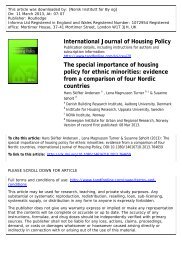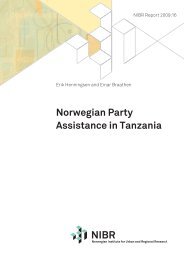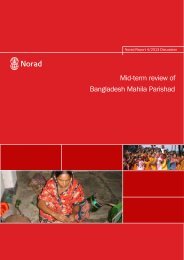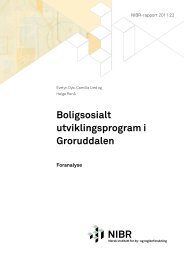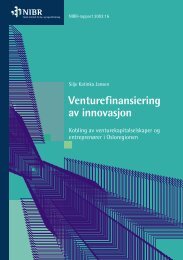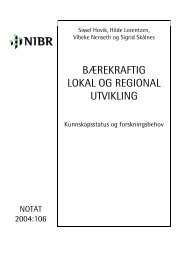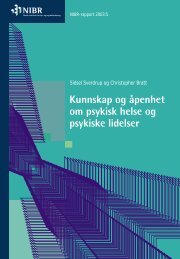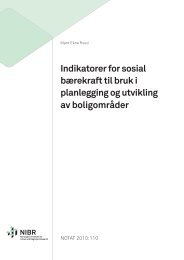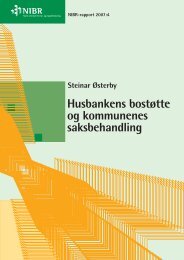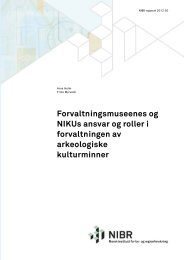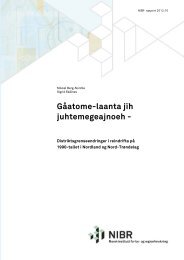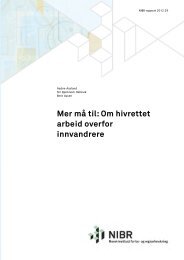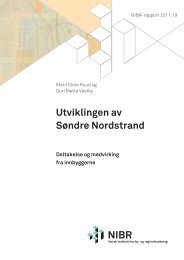Evaluation of the Southern and Eastern Africa Regional Centre for ...
Evaluation of the Southern and Eastern Africa Regional Centre for ...
Evaluation of the Southern and Eastern Africa Regional Centre for ...
- No tags were found...
Create successful ePaper yourself
Turn your PDF publications into a flip-book with our unique Google optimized e-Paper software.
8Kenya <strong>and</strong> Zimbabwe. Ano<strong>the</strong>r area <strong>of</strong> impact concerns <strong>the</strong> deliberations involved incourt judgements, <strong>and</strong> legal assistance in Zimbabwe. The course had helpedemployees to highlight ‘gaps’ in current legal practice <strong>and</strong> in using a ‘gender lens’directed at reworking judgments <strong>and</strong> altering decision making. Institutional impact inZambia is most apparent in <strong>the</strong> police <strong>for</strong>ce, where <strong>the</strong>re are examples <strong>of</strong> how <strong>the</strong>graduates have improved <strong>the</strong> work on women’s issues, in particular on gender basedviolence. The NGO sector employer respondents indicated how graduates in <strong>the</strong>iremployment had been highly beneficial in contributing a more proactive <strong>and</strong>evidence based approach to <strong>the</strong>ir work.Limits to impactThough <strong>the</strong> <strong>Centre</strong> is described as a key resource, most notably <strong>for</strong> its graduates,<strong>the</strong>re remains, none<strong>the</strong>less, <strong>the</strong> assumption that graduates are able to impactinstitutional structures. Not only is this outside <strong>of</strong> SEARCWL’s control, but it alsounderplays <strong>the</strong> nested nature <strong>of</strong> power within institutions. As explained bygraduates, institutional relations were extremely difficult to alter, especially due tohierarchy. One highly relevant avenue was that <strong>the</strong> findings in dissertations could bemade better known to maximise potential <strong>for</strong> impact. More accessible <strong>and</strong> strategicknowledge could be an asset to state <strong>and</strong> civil society actors.SEARCWL is active mainly if not almost entirely in Zimbabwe <strong>and</strong> <strong>the</strong> alumnaegraduates are also relatively well networked in Zimbabwe but networking decreases<strong>the</strong> fur<strong>the</strong>r one moves to o<strong>the</strong>r countries. The need <strong>for</strong> strategic interventions withalumnae was keenly felt in Zambia <strong>and</strong> Kenya.SEARCWL responseThe evaluation finds that though <strong>the</strong>re appears to be discussion amongst <strong>Centre</strong>staff, <strong>the</strong>re is lack <strong>of</strong> a strategic document or policy vision <strong>for</strong> <strong>the</strong> <strong>Centre</strong>’s activitiesas a whole (i.e. over <strong>and</strong> beyond <strong>the</strong> Masters itself), especially, discussion <strong>of</strong> outreach.Often this was put down to shear time <strong>and</strong> human resource constraints that arecertainly important considerations. However, <strong>the</strong>re might be certain issues or areaswhere <strong>the</strong> <strong>Centre</strong> could concentrate its ef<strong>for</strong>ts year to year more proactively ra<strong>the</strong>rthan appearing to react to situations as <strong>the</strong>y arise. Again, <strong>the</strong> fur<strong>the</strong>r away fromZimbabwe, <strong>the</strong> more rapidly <strong>the</strong> presence <strong>of</strong> <strong>the</strong> SEARCWL diminishes, which alsosuggests <strong>the</strong> need <strong>for</strong> higher degree <strong>of</strong> strategic prioritisation.Financial governanceThe agreement has been adhered to in a timely <strong>and</strong> efficient manner, as recognisedby all parties. Fur<strong>the</strong>rmore, annual audits are up to date with no signs <strong>of</strong>irregularities. However, <strong>the</strong>re have been a number <strong>of</strong> different financial fundingarrangements over <strong>the</strong> years. These have largely been a creative response tochallenges <strong>of</strong> financial management in Zimbabwe. Though <strong>the</strong>re is also a graduallymore stable situation in Zimbabwe since dollarization <strong>and</strong> with <strong>the</strong> Government <strong>of</strong>National Unity in 2009, <strong>the</strong> future is still very uncertain.<strong>Regional</strong> Advisory BoardThe board has provided pr<strong>of</strong>essional <strong>and</strong> highly competent advice <strong>for</strong> steering <strong>the</strong>course related activities in particular. It also appears to have become more vocal on



